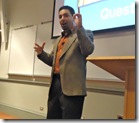It is common to see relational breakdown at the Catholic/Protestant intersection: a married couple, one of whom is Evangelical and the other a Catholic, must decide which church they will attend. Do the children join youth group or their parish’s equivalent? How about fulfilling sacraments like Holy Communion? Is it okay for an Evangelical parent to approve of their children’s observance of Catholic customs with which they disagree? Do such concessions communicate loving support or a negligent compromise? These issues often tear the fabric of marriage and family.
![sistine.chapel.vatican.2[1] sistine.chapel.vatican.2[1]](http://chriscastaldo.com/wp-content/uploads/2011/11/sistine.chapel.vatican.21_thumb.jpg) In addition to problems that occur within one’s immediate family, there are also difficulties with extended relatives. For instance, Grandma Amelia dies and her family must decide if she is to have a Mass or an Evangelical funeral. Do you put a cross or a crucifix over her casket? Is it okay to sing the Ave Maria? These may sound like insignificant questions; however, families regularly face them with precious relationships hanging in the balance.
In addition to problems that occur within one’s immediate family, there are also difficulties with extended relatives. For instance, Grandma Amelia dies and her family must decide if she is to have a Mass or an Evangelical funeral. Do you put a cross or a crucifix over her casket? Is it okay to sing the Ave Maria? These may sound like insignificant questions; however, families regularly face them with precious relationships hanging in the balance.
The issue of Evangelical-Catholic relations is not only pressing on families, but also has profound implications for large numbers of people, not least of whom is the hurting world which needs to see the life of Christ. Consider this story: Lord James Mackay was born in Edinburgh, Scotland, in 1927, into an extremely devout Evangelical family that belonged to the Free Presbyterian Church. It was there that young Mackay was raised to love Christ. His devotion was evidenced by his 30 years of service as a church elder. In his distinguished career as England’s most eminent judge, Mackay’s reputation for being a man of faith preceded him.
The problem started when two of Mackay’s colleagues died, both of whom happened to be Roman Catholic. After attending the second of these funeral services, Lord Mackay was confronted by Free Presbyterian Church Elders. They accused him of sin, asserting that the Catholic funeral services he attended included masses, which they considered to be an affront to the gospel of Scripture. The charge was not that Mackay had taken the Eucharist but that he had simply attended the services. Consequently, he was not permitted to actively serve or to take communion in his denomination until he repented. When he defended his actions, the case was reviewed by the Synod. A vote was taken and went against him, 33 to 27. In the aftermath of his censuring, Lord Mackay left the Free Presbyterian Church.
The decision of the Synod to discipline Mackay for attending the Catholic funerals was so intensely controversial that the issue divided Free Presbyterians throughout Scotland. Many spoke out on behalf of Mackay, and when they didn’t receive a hearing, entire congregations broke off to form another denomination. They created what eventually came to be called Associated Presbyterian Churches. The interesting twist is that when these churches seceded, a legal battle ensued over the ownership of their church buildings. Who would get the parish land and facilities? Did they belong to the congregation or the denomination? The disagreement was so sharply disputed that it ascended to the highest court in the United Kingdom—the courtroom of none other than Lord Chancellor James Mackay.
For those who were unable to join us last Tuesday, you may access the lecture recording below. From a technological standpoint, it was a disaster. The classroom’s “smart desk” didn’t like my iPad II. We are thankful, however, that the Lord allowed us to capture the audio.





